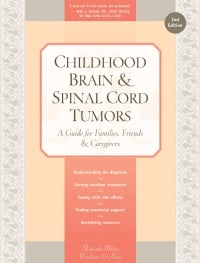Childhood Brain and Spinal Cord Tumors
Dying in the hospital
Some children die in the hospital suddenly, while others slowly decline for weeks or months. If your child is slowly dying, you may have choices about where he will spend his last days. There are no right or wrong choices. Much depends on the number of people available to provide care at home and how comfortable they are doing so. Many parents ask their child where she would prefers to be. Some children and teens want to be with the nurses in a hospital environment, but others want to stay at home with brothers, sisters, friends, and pets.
Parents, children, and staff should talk honestly to decide on the appropriate place for the child and then obtain the support (e.g., hospice care, private nurses in the hospital, family members) needed to make the choice a comfortable reality. Remain flexible so that as the situation changes, options remain open. If the choice is made to die in the hospital, most hospitals have a palliative care team that can help families make choices that emphasize comfort.
Although we had been advised that it didn’t look good for Greg, we were trying one last time to get him to transplant. He was sleeping quietly in his hospital bed. He had been complaining of severe head pain, and was on a low morphine drip. The afternoon nurse woke him to take vitals, and he chatted with her. He told me, “Mom, I’m going to go back to sleep, I love you.” Two hours later the night nurse tried to wake him up to give him some medicine, and she couldn’t wake him. They called the doctor in from his home, and he ordered a CT scan. When the film came up to the floor, the doctor took me out in the hall and said, “He’s not going to live through the night.” He held up the film showing a massive cerebral infarction; Greg was bleeding into the brain. He quietly died less than an hour later. Family and staff were in total shock. Nobody expected it. But, looking back, Greg had decided he had had enough; he was ready to go. I am grateful that he didn’t die on a transplant floor in a strange city. We were able to call in friends and family, and we were surrounded and supported by the wonderful nurses whom we knew so intimately. I couldn’t leave him until three nurses promised to stay with him and escort him to the morgue. They are still dear friends.
Parents of children who died in the hospital stressed the importance of clear communication. Parents need to be strong advocates for adequate pain control, and they need to clearly tell the staff their wishes for their child’s end of life. For example, in most hospitals, if a patient’s heart stops or if he stops breathing, the staff immediately begins cardiopulmonary resuscitation (CPR) and electric shocks to the heart—this is called a “code.” If the parents have decided they are ready to let their child die naturally, they need to discuss their wishes with the oncologist and ensure that an order of “NO CODE” is put in the chart and on the child’s door. A No Code order is also called a DNR, or “Do Not Resuscitate” order. Family members should understand that a DNR does not mean “Do not care for my child.” On the contrary, it allows the medical team to provide comfort measures, such as:
- Allowing the child to sleep during the night without interruptions for temperature and blood pressure
- Providing adequate pain medication
- Allowing family and friends open visitation without restrictions as to length and time of stay and the number of people allowed in the room
- A private room
Alannah was medicated at any indication of discomfort, and after a week of semi-consciousness followed by a week of coma, we finally got up the guts to have her taken off the respirator, to let her go. She opened her mouth a couple of times, as if trying to breathe, and that was it. With her mother and I holding her, the staff just left us alone. Fifteen minutes later, the attending doc came back and declared time of death. She left very peacefully. We were told to expect that she might seem to be struggling or gasping, and that it would just be reflex, that she wouldn’t really be struggling. It didn’t happen.
Parents also should discuss whether they want nurses or doctors present when their child dies. Many families feel very close to the hospital staff and feel supported by their presence, while others prefer to have only family and close friends at the child’s bedside. Advance planning helps to ensure that, as death approaches, the family’s wishes are understood and respected.
Table of Contents
All Guides- Introduction
- 1. Diagnosis
- 2. The Brain and Spinal Cord
- 3. Types of Tumors
- 4. Telling Your Child and Others
- 5. Choosing a Treatment
- 6. Coping with Procedures
- 7. Forming a Partnership with the Treatment Team
- 8. Hospitalization
- 9. Venous Catheters
- 10. Surgery
- 11. Chemotherapy
- 12. Common Side Effects of Chemotherapy
- 13. Radiation Therapy
- 14. Peripheral Blood Stem Cell Transplantation
- 15. Siblings
- 16. Family and Friends
- 17. Communication and Behavior
- 18. School
- 19. Sources of Support
- 20. Nutrition
- 21. Medical and Financial Record-keeping
- 22. End of Treatment and Beyond
- 23. Recurrence
- 24. Death and Bereavement
- 25. Looking Forward
- Appendix A. Blood Tests and What They Mean
- Appendix C. Books and Websites

